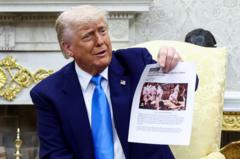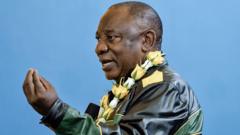Mark Zuckerberg unveils changes at Meta, prioritizing a culture that endorses "masculine energy" amid a decision to replace traditional DEI programs with an inclusive yet equitable approach. The tech giant's policies are poised for significant alterations reflective of this new ethos.
Mark Zuckerberg Advocates for 'Masculine Energy' in Corporate Culture Over Traditional DEI Approaches

Mark Zuckerberg Advocates for 'Masculine Energy' in Corporate Culture Over Traditional DEI Approaches
In a recent interview, Meta's CEO shifts the company's focus from conventional diversity initiatives to celebrating a balanced workplace that embraces masculine traits.
Meta CEO Mark Zuckerberg has recently articulated a striking new vision for his company, moving away from conventional diversity, equity, and inclusion (DEI) practices and instead underscoring the significance of “masculine energy” within corporate culture. In a candid exchange with Joe Rogan, Zuckerberg discussed how Meta is adopting fresh strategies to cultivate a more equitable workplace atmosphere.
“A lot of the corporate world is pretty culturally neutered,” Zuckerberg remarked to Rogan. While acknowledging the necessity of supporting women in business, he argued that corporate culture has inadvertently stigmatized masculinity. “Both of these things are good,” he commented, referring to the importance of harmonizing masculine and feminine attributes within the workplace.
Zuckerberg is encouraging a culture at Meta that unreservedly celebrates “a bit more aggression,” positing that it can drive innovation and enhance competitiveness. This mindset is already being acted upon through pivotal policy changes, including the removal of menstrual products from men’s restrooms—a measure initially implemented for the benefit of nonbinary and transgender team members.
Moreover, Meta has taken the remarkable step of phasing out its DEI initiatives, with an internal memorandum citing the term “DEI” as having become “charged” and suggestive of preferential treatment. The organization is pivoting towards policies that advocate for fairness and inclusivity while eschewing divisive categorizations.
These transformations extend beyond Met’s internal framework, as the company has recently discontinued its fact-checking program, raising eyebrows about potential political biases inherent in fact-checkers’ decisions. This strategic move marks Zuckerberg's attempt to reassert control over the platform's policies and quell critique regarding Meta’s methods of managing bias and content moderation.
These announcements follow a pivotal interaction that Zuckerberg had with former President Donald Trump at his estate in Florida. Despite their previously fraught relationship, Zuckerberg characterized the meeting as “positive,” while expressing hope and optimistic sentiments regarding Trump's administration.
As Zuckerberg dismissed insinuations that the timing of Meta’s policy shifts is politically inspired, he clarified that they are part of a comprehensive, long-range strategy aimed at cultivating a more competitive and harmonious corporate ethos. “It’s one thing to say we want to be welcoming and create a good atmosphere for everyone, but it’s another to basically label masculinity as bad,” he said. “We’re striving for balance.”
With Meta’s departure from DEI practices and its refreshed emphasis on cultural equilibrium, Zuckerberg’s vision is igniting discussions across multiple sectors. As Meta embarks on this new journey, it remains uncertain how these transformations will be embraced by employees, users, and the greater tech community.






















